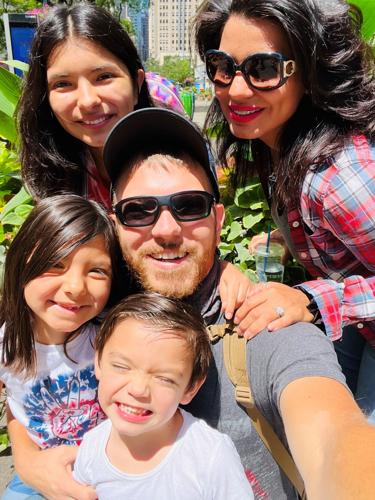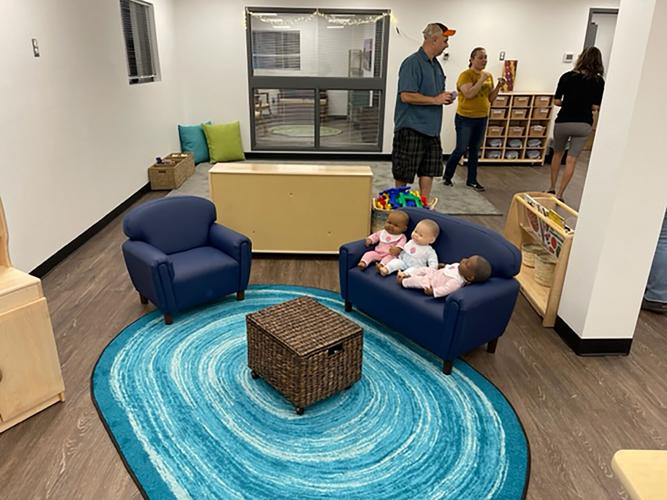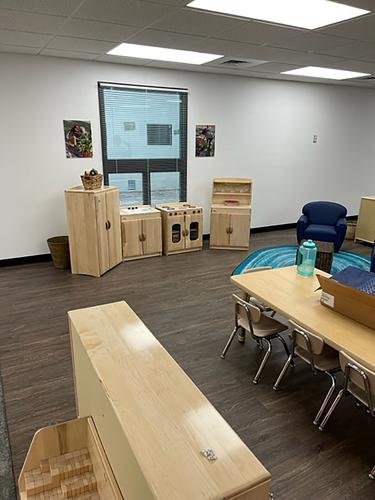After spending last school year juggling a full-time course load at Pima Community College and caring for her three young children, Azucena Hughes is hopeful this year won’t be so stressful.
Those hopes are hanging on an application she submitted for her 3-year-old son, Matthew, to attend the new Early Learning Center at PCC’s Desert Vista Campus on Tucson’s southwest side.
It opens this school year after the college spent 11 months and $482,760 converting a 1,895-square-foot office building into an on-campus child care center to support its high population of students who are also parents.
To start, PCC’s center will offer free child care for a handful of eligible student-parents. Right now, there are 20 slots open for children between the ages of 3 to 5 years old whose families have incomes up to 200% above the federal poverty level.
High cost of care
In an era when the cost of high quality child care is often as much if not more than rent — and hard to come by even if you can afford it — Hughes said having a safe place to leave her youngest child while she works toward her lifelong goal of becoming a physician would be a game-changer for her family.
“I’ve been wanting to go to school for the longest time,” said Hughes, who served in the U.S. Army and had three children before making the decision to go back to school in her early 30s. Her husband, Christopher, also works and goes to school. So, she said, “Trying to arrange child care, working at my work-study job and staying focused in school has been hard.”
Although her two older children are already in school during the day — Tucson Unified School District just announced it will cover the cost of before- and after-school care this year — she worries about her son Matthew, who will be 4 at the end of this month.

Child-size couches and chairs at the Early Learning Center at PCC’s Desert Vista Campus.
“From the moment he wakes up, he wants to play with people all day. He needs social interaction and needs to play with kids his age,” Hughes said. “It’s sad to have to shut him down and say ‘I have homework.’”
She already has had expensive experiences with trying to pay for day care for her two older daughters and knew it wasn’t something they were going to be able to afford now. According to data from Pima County, a year of preschool in the area can cost between $7,920 and $9,240.
Instead, she pays for child care with her time.
“I stay up after they go to bed to get my work done,” said Hughes, who is both a student senator and straight-A student. “I can’t just neglect their needs because I’m in school. Something has to give, and unfortunately that’s been my personal time and sleep.”
‘More productive’
When she heard about PCC’s plans to open the free child care center, she immediately applied.
“I could immediately see my baby having fun there,” Hughes said after checking out the classroom filled with tiny chairs, tiny tables, toys and books and an adjacent playground. “Even when I’m not with him, I’m still thinking about him. Having the peace of mind that he is near me, in a safe environment and having fun and learning, makes me feel like I can be more productive.”
As of Wednesday, Hughes was still waiting to hear the official word on whether or not her son got one of the 20 available spots.

Azucena Hughes, top right, is a student at Pima Community College who is working toward her lifelong goal of becoming a family medicine physician. But because both her and her husband, Christopher, center, work and go to school, balancing child care responsibilities for her three children, Cheyenne, 12, Bella, 8, and Matthew, 3, is expensive and challenging.
The college, which will give priority to single parents who meet the income threshold, said it had received 75 applications so far, though not all applicants meet the criteria of having a preschool-age child. If a student-parent doesn’t meet the requirements for the on-campus center, the college can help them find a provider in Tucson and frequently offers subsidies to offset the costs.
But the Desert Vista child care center is so appealing, in part, because it’s more than a day care. It’s set to offer high quality early childhood education modeled after the federal Head Start Program and will be partially staffed by experiential learning PCC students studying early childhood education.
Social investment
Pima’s investment in high-quality on-campus child care — offerings the college said it wants to expand, but doesn’t have concrete plans for yet — is expected to yield high social returns.
Since 1967, Child-Parent Centers, Inc. has administered all Head Start programs in Southern Arizona. Though the families enrolled at the Desert Vista center will not be enrolled in an official Head Start program, a partnership between Child-Parent Centers and PCC will help to ensure the delivery of a high-quality program there nonetheless.
“Students have better outcomes when they know their children are on campus or on-site in high-quality learning environments,” said Eleanor Droegemeier, board chair of Child-Parent Centers. “The impact of these experiences goes well beyond the preschool years. Graduation rates are higher for children who have been in high-quality programs, incarceration rates are lower, there’s more employment opportunities and higher educational attainment.”
In addition to assistance from Child-Parent Centers, launching of the early learning center is the result of a collaboration between the college and multiple other community organizations.
Pima Early Education Program Scholarships, which the Pima County Board of Supervisors created in 2021 and which has since allotted millions to subsidize preschool for low-income families, is covering the majority of operating costs for the child care center.
The United Way of Tucson and Southern Arizona helped develop the center with funding and programming support. It’s also made the center a part of its Accelerate Quality Program, which provides coaching and technical support, small improvement grants and program assessments to early education and care centers.

View of the new Early Learning Center at PCC’s Desert Vista campus.
“This is an economic development initiative,” said Tony Penn, president and CEO of United Way of Southern Arizona. “If you want more organizations to plant a flag in Tucson and Southern Arizona and bring the jobs, opportunities and revenues and all the things that come with it, it (depends) on the investment we make in educational attainment.”
Single mothers in Arizona with at least an associate’s degree earn an average of $7,000 more a year than a single mother with just a high school education, according to a 2018 report from the University of Arizona and the Women’s Foundation of the State of Arizona. Those with a bachelor’s degree can expect to earn more than double.
Made school possible
So, in addition to attracting more businesses to Tucson, making it easier for student-parents to focus on school also means increased earning — and spending — potential for more residents.
Kassondra Baker, a mother of two small children who recently graduated from PCC with a certificate in logistics, knows this firsthand.
She had worked in the service industry for years and wanted to shift into something that felt more financially secure. But it was going to be $1,800 a month to put both of her kids in day care while she went to school. And with a $1,300 rent for a two-bedroom apartment, that was not affordable. Baker felt fortunate, then, when she received a substantial child care stipend from the Women’s Foundation for the State of Arizona.
“I don’t think I would have been able to go back to school if I wouldn’t have had that,” Baker said. “It just wouldn’t have made financial sense for me to go back to school.”
Now that she has her certificate, Baker is considering going back to school to pursue a degree in either business or hospitality. Knowing that PCC has at least some on-campus child care options takes away some of the anticipated stress of making that happen.
“Having a day care facility inside of the college where you’re going is so much more helpful for the parents who may not have gas money to drop off their kids across time or feel rushed,” she said. “You can just load everyone up, take them to their classroom, then walk to your classroom and feel like they’re closer to you.”






